The name of this fern is misleading, suggesting that it offers value to the garden only in fall. Certainly it is a highlight of autumnal designs, but the first photograph below was taken at the end of June! I was cutting equally colorful fronds in August for my daughter’s wedding bouquet, and even in the depths of winter, the younger fronds have russet tones.
Autumn fern is usually available in 4-inch pots, as well as larger sizes, making it a great addition to even small container gardens. It transplants easily, so rather than wasting it, I simply transfer it to the landscape when it becomes too large for the pot. In the ground it spreads slowly by underground rhizomes, yet it’s never invasive.
Easy care, evergreen, colorful, deer resistant and ignored by rabbits (so far in my garden, anyway), this fern has a lot to offer.
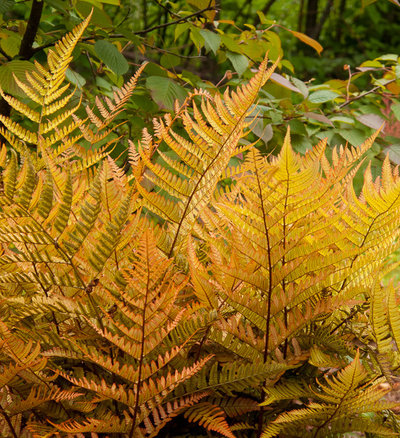
Le jardinet
Botanical name: Dryopteris erythrosora
Common name: Autumn fern
Origin: Japan, China, Korea, Taiwan
Where it will grow: Hardy to -10 degrees Fahrenheit (USDA zones 6 to 9; find your zone). It has been reported as being root hardy (but not evergreen) to zone 5.
Water requirement: Average, moisture-retentive soil
Light requirement: The brightest colors develop in dappled light, but this fern will also grow well in deeper shade.
Mature size: 2 to 3 feet tall and wide
Benefits and tolerances: Deer and rabbit resistant; low maintenance
Seasonal interest: Year-round
When to plant: Spring or fall
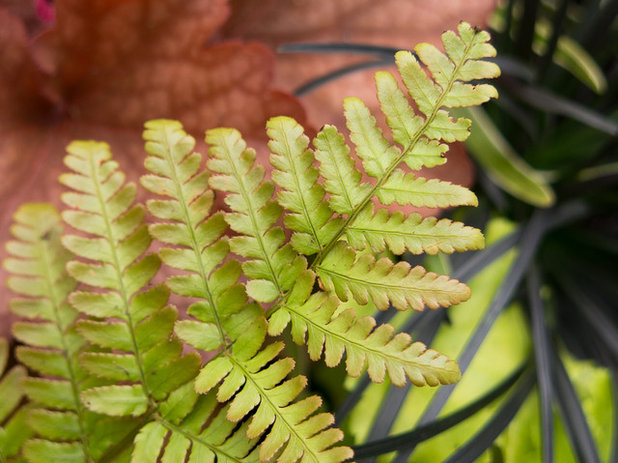
Le jardinet
Distinguishing traits. Autumn fern is evergreen and has colorful foliage.
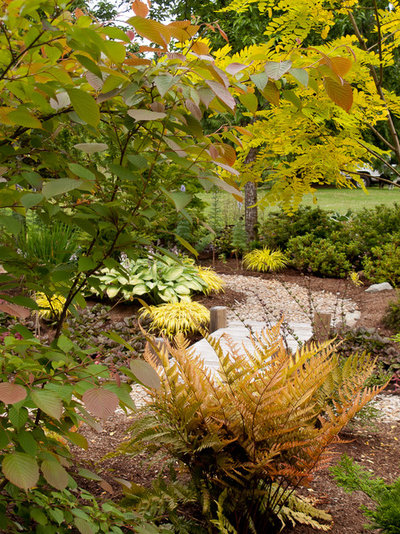
Le jardinet
How to use it in the landscape. Autumn fern is the perfect addition to woodland gardens in the dappled shade beneath deciduous trees. Pair it with plants that have bolder foliage, such as
hostas and
rhododendrons, together with finely textured grasses, such as black mondo grass (
Ophiopogon planiscapus ‘Nigrescens’) and Japanese forest grass (
Hakonechloa macra ‘Aureola’).
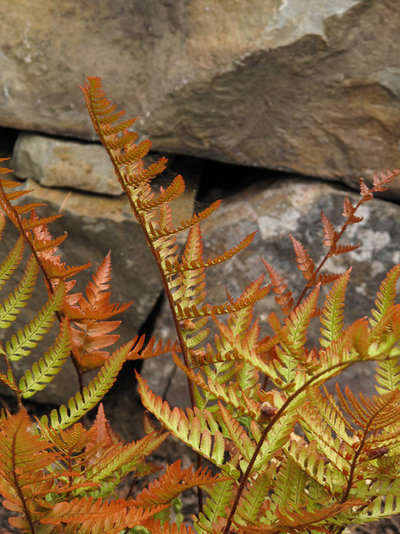
Le jardinet
Its size and open vase shape are useful for softening stone walls or accenting large boulders.
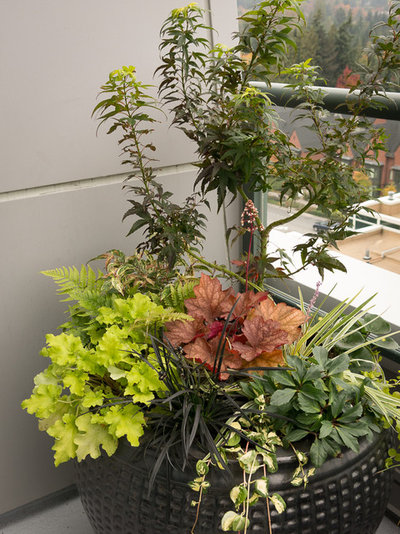
Le jardinet
How to use it in a container garden. In this container the dwarf Japanese maple (
Acer palmatum ‘Mikawa Yatsubusa’) is the star. The foliage emerges a soft yellow before maturing to a midgreen. Fiery shades of orange and red are a highlight in autumn, but even after the leaves have fallen, the smooth olive-green branches add interest.
Paprika
coral bells echo the sunset tints of the autumn fern, while Lime Rickey coral bells, spiky and grass-like Silver Dragon
lilyturf (
Liriope spicata)
and trailing variegated
periwinkle (
Vinca maculata ‘Wojo’s Gem’)
add lighter notes of creamy yellow and chartreuse. Rounding out the design are black mondo grass and the gray-green foliage of Jacob
hellebore (
Helleborus niger ‘Jacob’).
All the plants in this lower tier are evergreen, making this a year-round design, yet it’s not static. The lilyturf, coral bells, hellebore and black mondo grass will all bloom at different times of the year, while the autumn fern will shine with richer copper shades for many months.
Planting notes. Like many evergreen ferns, this one benefits from having the oldest, dark green foliage clipped away in spring as the new fronds emerge. This is more for aesthetic purposes than necessity, however.
Deer and rabbit disclaimer: The phrase “Deer will eat anything if hungry enough” is often quoted. Personally, I prefer to say, “Deer will eat anything if expensive enough.” Either way, the information given here is based on my own battles and those of several highly reputable sources.
Although rabbits attack my herbaceous ferns, they have never touched these, possibly because the older fronds that are closer to the ground are too tough to be considered worth the effort.





